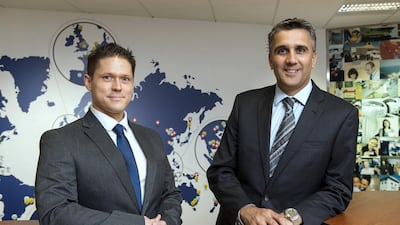Kyle Stelma’s job as the managing director of Dunia Frontier Consultants, a market research and financial advisory services company, takes him to parts of the world that have been generating headlines for all the wrong reasons.
In the past two years, this Dubai-based businessman’s travel itinerary has included Baghdad, Basra and Karbala in Iraq, and also parts of eastern Turkey and Myanmar – all of which are at “high or extreme risk” in terms of security, according to the medical and travel security risk company International SOS.
Business travel from the UAE has increased by 33 per cent during the past two years, according to a YouGov poll that International SOS conducted last year. Yet over the same period, political instability in the wider region has increased.
“Business executives based in the UAE are now often also responsible for the GCC, the Middle East and in some cases Africa too,” says International SOS’s regional security manager, Paul Doucet, who is from Canada.
The organisation is active 24 hours a day, seven days a week and its regional office, which includes 12 analysts, is in Dubai.
One of the ways that Mr Stelma, 42, from the US, stays safe when he travels to Iraq is by keeping a low profile.
“We rarely stay at high-visibility hotels, or operate with high-visibility escorts. It is never a good idea to have the nicest car on the street in some of these areas,” he says.
Despite the security risks, trips to Iraq are not uncommon for business executives based in the UAE, according to International SOS’s regional development director, Des Donnelly.
“As well as Qatar, London and Riyadh, Iraq is one of the top destinations for business travellers because the UAE is the staging post into Iraq for a lot of oil and gas companies,” he explains.
According to International SOS’s latest research, almost half (47 per cent) of the UAE’s business executives rely on media coverage to form their judgment of a country they are travelling to.
But according to Mr Doucet, the mainstream media can leave people with the perception that the world is a lot more dangerous than it actually is. “We take what’s happened in the news – for example a bombing in Basra in which 20 people are reportedly killed – and we look into it. The initial news reports often get it completely wrong. The subsequent reporting, that far fewer people will read, may say that actually only five people were killed. It is our job to continue to read about these things and put things into perspective.”
Iran, a country expected to have an increasing number of business travellers with the recent lifting of sanctions, is one case in point. The country was perceived by more than half of all respondents (54 per cent) in International SOS’s survey as a high security risk. But according to International SOS, Iran is of the safest countries in the region to visit – away from the border areas near Iraq, Afghanistan and Pakistan – and has a similar security risk rating to the UAE and most European countries.
Although some destinations might not be as dangerous as people assume, there are others for which travellers need to be made more aware of potential risks, says Mr Doucet.
“In Cairo and the surrounding area, there have been several incidents directly targeting foreigners in the past year, whereas previously there were none. The Italian embassy was bombed in June, a man was kidnapped and sold on to Islamic state in July, there have been carjackings – those incidents are worth researching to see what you can do about the risks.”
Before Mr Stelma boards his flights, he makes sure he has all the necessary international traveller coverage, and gets travel advice from his company’s own network of local researchers. “We’ve found that it’s always extremely important to get very specific travel advice from locals while we’re in any of the countries we cover,” he says.
Mr Donnelly sees International SOS as providing the role of business facilitators. But there are some hotspots they recommend even the most intrepid traveller to avoid – “like most of Syria and Libya, and places in Iraq like Anbar province”, says Mr Doucet. “In these cases, we would say that there is no mitigation that exists that is strong enough to completely [reduce] these threats. You simply cannot do business there.”
Mr Doucet says the most important item to bring with you on a trip overseas is a spare phone with a local Sim card, which contains the emergency contact details of people back home, and of your embassy.
He adds: “The more appropriate security measures you have in place before you go, the more ready you are to respond to a situation if it spirals out of control.”
International SOS will be speaking in Abu Dhabi on February 25 about “Mitigating risks for travellers and expatriates” at the Employee Management Seminar, Rosewood Hotel. It is organised by the Grid Initiative.
business@thenational.ae
Follow The National's Business section on Twitter

